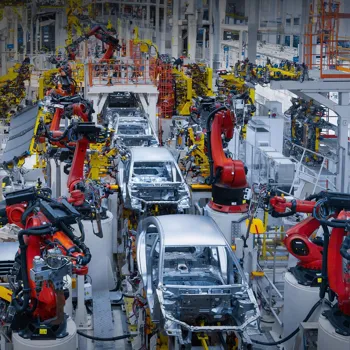Discover how Indian businesses are leading the charge for a greener future. Read about 8 companies driving sustainability
In the bustling landscape of Indian business, a quiet revolution is brewing. Companies
are increasingly recognizing that 'business as usual' is no longer an option.
The growing awareness of climate change and environmental degradation is pushing businesses to adopt sustainable practices, not just as a PR exercise, but as a core value.
This involves minimizing their environmental footprint, promoting social responsibility, and ensuring long-term economic viability. We spotlight eight Indian companies that are spearheading this green movement, demonstrating that sustainability and profitability can indeed go hand-in-hand.
These companies are not just paying lip service to environmental concerns but are actively implementing innovative solutions to reduce waste, conserve resources, and promote biodiversity.
From renewable energy adoption to the use of eco-friendly materials and ethical sourcing, these businesses are rewriting the rules of the game.
These companies are demonstrating that sustainability is not just a corporate social responsibility (CSR) activity but a strategic imperative that drives innovation and resilience. It’s about creating a better future for all, while also strengthening their bottom line.
Tata Consultancy Services (TCS):
TCS, a global IT behemoth, has ingrained sustainability into its operational DNA. The company shows its commitment through waste reduction and the use of renewable energy.
This includes strategies to cut back waste generation, use energy from solar and wind sources, and decrease water consumption across all its facilities. TCS regularly reports on its greenhouse gas emissions, energy consumption, and waste generation, demonstrating transparency and accountability.
Moreover, TCS actively invests in research and development of technologies that help its clients achieve their own sustainability goals, further amplifying its impact.
TCS works hard to reduce pollution and encourage eco-friendly transportation.
They promote alternatives like cycling, carpooling, and using public transport to reduce the employee carbon footprint. TCS further invests in carbon offset initiatives to counterbalance its remaining emissions.
By minimizing its environmental footprint and helping its clients do the same, TCS shows its deep commitment to a greener tomorrow.
They show that integrating sustainability into the IT sector is not just good for the environment, but also a smart business move that benefits the company and the community.
TCS is also dedicated to engaging its employees in sustainability initiatives.
Through awareness campaigns, training programs, and volunteer opportunities, TCS encourages its workforce to adopt eco-friendly habits both at work and at home.
This approach helps to establish a culture of sustainability within the organization, ensuring that every employee is a steward of the environment. By taking a holistic approach to sustainability, TCS is positioned to be a leader in environmental stewardship.
Their efforts prove that with commitment, any company can make a meaningful contribution to a more sustainable and resilient future.
Mahindra & Mahindra:
Mahindra & Mahindra, a well-known name in the automotive and farm equipment sectors, has embraced sustainability through eco-friendly manufacturing practices and the promotion of electric vehicles (EVs). Mahindra has committed to becoming carbon neutral by 2040, a testament to its ambition.

Mahindra uses renewable energy in its factories, cuts down waste, and designs vehicles for fuel efficiency. This shows they are serious about lessening their impact on our planet. Their commitment to electric vehicles is especially important in a country facing increased air pollution.
Mahindra also prioritizes responsible sourcing of raw materials, ensuring that its suppliers adhere to strict environmental and social standards. Mahindra is making EVs more common in India by investing in local manufacturing and charging infrastructure.
Mahindra is actively involved in community development projects, focusing on environmental conservation, education, and healthcare in the regions where it operates. These initiatives reflect Mahindra's broader commitment to creating shared value and contributing to the well-being of society.
Mahindra integrates sustainability through the whole supply chain, showcasing a strong commitment to environmental responsibility. Mahindra shows how a business can lead in both profit and planet care.
By integrating environmental considerations into every aspect of its business, Mahindra demonstrates that sustainability is not just a cost of doing business but a source of competitive advantage and long-term value creation.
Their approach serves as an example for other players in the automotive industry and beyond.
Godrej Industries:
The Godrej Group has a long history of prioritizing environmental and social responsibility, with Godrej Industries at the forefront. The company invests heavily in green building technologies, waste management systems, and water conservation projects across its operations.

Godrej also actively pursues biodiversity conservation initiatives, working to protect endangered species and restore degraded ecosystems. Godrej is working hard to reduce the impact of its operations on the environment and contribute to a healthier planet.
Godrej uses innovative ways to reduce its carbon footprint, setting a good example for others. Godrej is also committed to promoting sustainable agriculture practices, working with farmers to adopt methods that reduce their environmental impact and improve their livelihoods.
Moreover, Godrej provides employees with training programs to increase their knowledge of sustainability. By raising consciousness about environmental issues, Godrej promotes ethical conduct both inside and outside the organization.
Godrej's commitment to sustainability goes beyond just reducing its own environmental impact. They are actively involved in promoting sustainable lifestyles among consumers through educational campaigns and the development of eco-friendly products.
By empowering consumers to make informed choices, Godrej is helping to create a more sustainable marketplace. This holistic approach to sustainability positions Godrej as a leader in responsible business practices.
The company’s dedication serves as a model for corporations that seek to make a lasting beneficial effect on society.
ITC Limited:
ITC, a diversified conglomerate with a strong presence in FMCG, hotels, and agriculture, has emerged as a sustainability champion. ITC’s sustainable approach involves conserving water using renewable energy and managing waste well.

Across its numerous hotels and facilities, ITC has pioneered green building practices, setting a high standard for the hospitality industry. ITC uses renewable energy, manages water effectively, and recycles waste. They show strong dedication to lowering resource use and harmful releases.
ITC works closely with farmers to promote sustainable agricultural practices, helping them to improve their yields while reducing their environmental impact. ITC is dedicated to making a positive change in rural areas, helping farmers succeed and improving their lives.
ITC’s commitment stretches beyond just environmental protection. ITC also actively participates in social development programs in healthcare and education.
ITC is leading the way to prove that companies can do well for the world and earn profits through sustainable practices.
By integrating sustainability into its core business strategy, ITC has not only reduced its environmental footprint but has also created new business opportunities and enhanced its brand reputation.
ITC’s approach serves as an excellent case study for other large corporations seeking to embrace sustainability and create long-term value for shareholders and society alike.
Wipro:
Wipro, another IT giant, has made significant strides in embracing sustainability across its operations. Wipro is dedicated to lowering energy use, reducing waste, and using renewable energy sources.

Wipro has also set ambitious targets for reducing its greenhouse gas emissions and has invested in carbon offset projects to mitigate its impact. The company integrates eco-friendly practices into all processes to lessen ecological harm and use resources wisely.
Wipro’s commitment to sustainability extends beyond its own operations. They actively work with clients to help them achieve their sustainability goals. Wipro is dedicated to involving its employees in sustainability initiatives, promoting environmental literacy and encouraging responsible actions.
Wipro’s commitment to sustainability encompasses multiple areas, from lowering emissions to promoting sustainable business practices.
Wipro’s emphasis on sustainability has helped it attract and retain talent, enhance its brand reputation, and stay ahead of regulatory changes.
By integrating sustainability into its core business strategy, Wipro demonstrates that environmental responsibility can be a driver of innovation, competitiveness, and long-term value creation.
Wipro’s approach serves as a motivating example for other organizations aiming to create sustainable organizational growth.
Infosys:
Infosys, a leader in next-generation digital services and consulting, has always been at the forefront of integrating sustainable practices. The company's commitment involves using renewable energy, saving water, and responsibly handling waste.
Infosys is dedicated to developing eco-friendly facilities and cutting greenhouse gas emissions throughout its activities. The organization regularly releases detailed reports on its environmental performance, highlighting its advancements and ongoing projects.
Infosys is committed to engaging its employees in sustainability initiatives, creating a culture of environmental responsibility throughout the organization. Infosys also actively supports environmental education and awareness programs in the communities where it operates.
Infosys is committed to environmental protection and social well-being, participating in programs that benefit local people.
Infosys’ commitment to sustainability has not only reduced its environmental impact but has also enhanced its brand reputation and helped it attract environmentally conscious clients and employees.
By integrating sustainability into its core business strategy, Infosys demonstrates that environmental responsibility can be a source of competitive advantage and long-term value creation.
Infosys' initiatives show that any company can significantly contribute to a cleaner tomorrow with the right strategy.
HUL (Hindustan Unilever Limited):
HUL, a leading consumer goods company, has ingrained sustainability into its entire value chain. HUL’s sustainable approach means sourcing raw materials responsibly, reducing waste and focusing on social responsibility.

Furthermore, HUL aims to reduce its environmental impact across its operations, from sourcing raw materials to manufacturing and distribution. HUL’s focus on sustainable sourcing ensures that the raw materials used in its products are sourced responsibly.
HUL actively participates in water conservation and waste reduction programs to address important environmental problems. HUL is committed to empowering women through its Shakti program, creating livelihood opportunities in rural areas.
HUL is dedicated to making a positive difference in the lives of consumers and the communities where it operates.
HUL’s commitment to sustainability has not only reduced its environmental impact but has also strengthened its brand reputation and helped it connect with consumers who are increasingly concerned about the environment.
By integrating sustainability into its core business strategy, HUL is demonstrating that it is possible to be a force for good while also delivering strong financial performance. HUL shows that business can grow sustainably while meeting customer needs.
Tech Mahindra:
Tech Mahindra, a leading provider of digital transformation, consulting, and business re-engineering services, has embraced sustainability as a core business principle. Tech Mahindra focuses on lowering emissions, saving energy, and using resources responsibly.
Tech Mahindra is committed to using renewable energy across its operations and reducing its carbon footprint. The company has adopted green building practices in its facilities and invests in carbon offset projects.
Tech Mahindra also works with its clients to help them achieve their sustainability goals. They offer a range of services such as green IT solutions, energy management consulting, and sustainable supply chain management.
Tech Mahindra values the involvement of its staff in making sustainable choices. The company motivates personnel to embrace eco-friendly practices, raising consciousness of environmental topics.
Tech Mahindra is leading the way in sustainable business practices, setting an inspiring example for corporations around the globe. By implementing sustainable solutions, Tech Mahindra is actively reducing environmental effects.
The company actively strives to have a beneficial impact on the communities it serves.
These eight companies are shining examples of how Indian businesses are embracing sustainability to create a greener future.
Their efforts demonstrate that sustainability is not just a buzzword but a strategic imperative that can drive innovation, enhance competitiveness, and contribute to a more sustainable and equitable world.
As awareness of environmental and social issues continues to grow, we can expect to see even more Indian companies stepping up and joining the charge towards a greener future.
AI Generated Content. Glance/InMobi shall have no liability for the content














